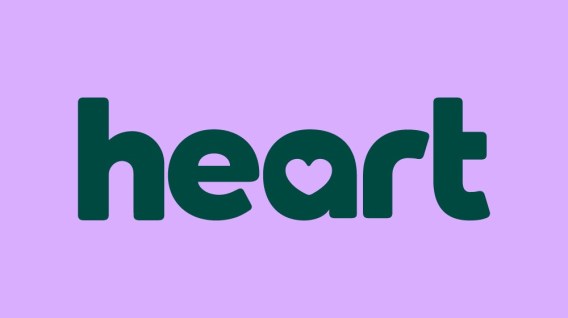Two strong hearts: SCA baits ARN with new Heart Network

Heart is SCA's new digital audio network. Sound familiar?
This morning, Southern Cross Austereo announced the Heart Network, a new national band of music stations streaming across DAB+ and Listnr. Tomorrow, rival network ARN will announce a major refresh of its iHeart app. Is that the sound of lawyers circling?
SCA’s Heart Network will start with two adult contemporary stations — Heart and Heart Hits — before following what it calls “a clear roadmap for further expansion across genres and formats” in a media release issued on Tuesday morning.
The Heart station is “crafted for a female audience, offering a mood based format that helps listeners to escape and unwind with a diverse range of songs spanning the 70s, 80s to now” — with the ‘now’ portion compressing four decades into a narrow funnel featuring the likes of Ronan Keating and Ed Sheeran. Heart Hits, meanwhile, “caters for a nostalgia driven audience” with the likes of Madonna, Queen, and U2 on high rotation.
The timing of this announcement cannot be understated.
When Mumbrella reached out to ARN for comment, nobody was available: all key staffers were in rehearsals for the network’s first-ever upfront presentation at The Star casino in Sydney tomorrow.
These key staffers told Mumbrella, during a pre-upfront briefing on Monday afternoon, they are expecting around 1,000 people to attend its debut upfront — as you read this, busy workers are installing temporary grandstand seating to accomodate the crowd.
SCA decided to launch the Heart Network less than 24 hours before ARN will announce a major update to its iHeart app. ARN’s plans were not a tightly-held secret, either, with outgoing CEO and managing director Ciaran Davis telling Mumbrella of the app refresh back in August, promising it will be unveiled at the October upfront.
The SCA launch seems to be a direct shot at the competition, and one that isn’t even aimed at Kyle and Jackie O and their “game of audio porn”, either.
Neither ARN or SCA have exclusivity over ventricle-related radio branding.
The iHeart brand was first launched in 2008 by US radio behemoth Clear Channel to differentiate its streaming radio service. This was back when mobile audio was ruled by the iPhone and the iPod, and thus all future-leaning ventures in the broad entertainment or technology space were required to dutifully affixed a lower-case i to the front of its products.
The iHeart brand slowly swelled to include Clear Channel’s entire digital play, then was spun into a successful music festival, before iHeart Media replaced Clear Channel as the company name. In Australia, the iHeart app launched in September 2013, part of a “multi-decade” exclusivity deal with ARN.
But, the heart wants what the heart wants.
In the UK, there is a network of 13 radio stations and 8 digital “sister stations” branded Heart, the first of which launched in 1994 in the West Midlands as 100.7 Heart FM, playing a smooth blend of Simply Red, Lionel Ritchie, and Simply Red. The format was repeated in various regions until by its 2010 saturation peak there was 33 Heart radio stations across the UK.
So, who owns the trademark? Can you be the owner of a lonely heart, or should the heart be open to all?
A company named iHM Identity, Inc — owned by iHeart Media — holds multiple related trademarks in Australia.
In 2022, the company sued the operators of a website with the URL iheartradio.games, which — as iHM’s filings explained — “appears to be operating in partnership with a Moscow based ‘model agency’, but is suspected to be a brothel.”
They won the case, and the URL was handed over.
But what about Heart?
In 2004, Australian regional radio operator RG Capital Radio successfully took over a registered trademark for ‘Heart’, lodged in 1980 by the operators of what appears to be a dormant Australian-based fan club magazine for the US band Heart.
That same year, RG Capital was taken over by Macquarie Bank, which gobbled up a number of networks, building the Macquarie Media Group which took over Southern Cross Broadcasting, which eventually became Southern Cross Austereo — current owner of the Heart trademark.
Matthew O’Reilly, SCA’s head of broadcast content explained it to Mumbrella on Tuesday morning.
“We’ve owned the Heart brand for quite a number of years,” O’Reilly said.
“One of our stations in Hobart was called Heart … it’s a brand that we’ve had. When we talked about what we wanted to achieve with the music format, and where we wanted to position it, we tossed around a heap of names and we decided to go with the one that we already had trademarked – and had used in the past.”
Case closed.
The link between heart and music is not a novel one.
The heart in its various states of skipping, breaking, racing, and loneliness, has been a mainstay in pop songs since songs first became popular. The Beatles popularised the notion of a Lonely Hearts Club Band, while Elvis holed up in Heartbreak Hotel.
Berry Gordy, the founder of the Motown label, credits the success of his early singles to a formula he devised where a song’s tempo was intended to double the rate of the human heartbeat, prompting a visceral response to the music. The climax of any electronic dance song worth its salt relies upon a steady increase of beats-per-minute before “the drop”, a dramatic pause that can literally affect heart rates. Stretching the link even further, in CPR training, students are taught to silently recite the rhythm of Staying Alive in their heads, as a guide to the correct pace of chest compressions.
In short, it seems the Heart saga probably won’t be played out in the courts after all. See you after ARN’s upfront tomorrow.


